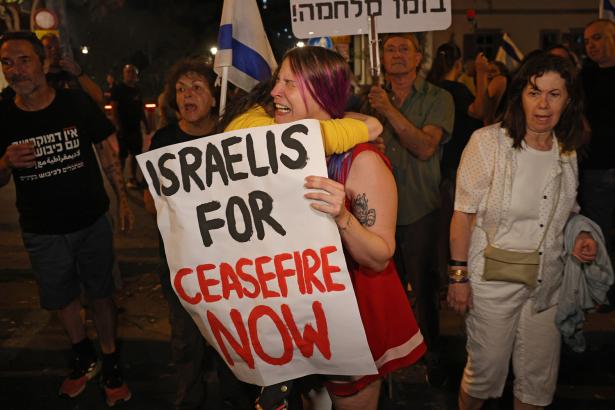Rights groups in Israel on Wednesday demanded a cease-fire in their country's four-month war on the Gaza Strip as Israeli Prime Minister Benjamin Netanyahu rejected a deal proposed by Hamas and renewed his pledge to destroy the Palestinian group.
"An immediate cease-fire will prevent further loss of civilian lives and facilitate access to vital aid for Gaza to address the unprecedented humanitarian catastrophe there," said 17 Israeli civil society groups.
In addition to calling for a cease-fire and urging "Israel to allow unfettered entry and delivery of humanitarian aid and goods into and throughout Gaza, as directed to do so by the International Court of Justice," which has taken up a genocide case against the Israeli government, the coalition said that "Hamas must unconditionally release all people taken hostage on October 7."
The groups pointed to the estimated 27,000 Palestinians killed so far—mostly innocent men, women, and children—and a largely displaced civilian population of over 2 million in Gaza suffering a lack of access to necessities like food, water, and medicine.
"We call on the international community to uphold its legal obligation to restore respect for international humanitarian law and protect civilians," the coalition said. "The international community must ensure that all those responsible for grave violations of international humanitarian and human rights law be held accountable."
Meanwhile, after meeting with U.S. Secretary of State Antony Blinken on Wednesday, Netanyahu went on television and rejected a new Hamas proposal to gradually reduce fighting as well as free hostages and Palestinians jailed in Israel.
"We haven't committed to anything. We haven't committed to any of the delusional demands of Hamas, the numbers of terrorists with blood on their hands [to release]," the prime minister said, according toCNN. "There is not a commitment—there has to be a negotiation, it's a process, and at the moment, from what I see from Hamas, it's not happening."
"We are on the way to complete victory. The victory is achievable; it's not a matter of years or decades, it's a matter of months," Netanyahu claimed of the war his government launched on the Palestinian enclave after the Hamas-led attack in October.
Adina Moshe, a 72-year-old Israeli formerly held hostage by Hamas, said Wednesday: "Mr. Netanyahu, I'm turning to you. It's all in your hands. You are the one. You're the one who can. And I'm really afraid that if you continue the way you do, the destruction of Hamas, there won't be any hostages to release."
According toReuters:
A senior Hamas official, Sami Abu Zuhri, described Netanyahu's remarks as "political bravado" that showed the Israeli leader's intention to continue conflict in the region.
Another Hamas official, Osama Hamdan, said a Hamas delegation led by senior Hamas official Khalil Al-Hayya would travel on Thursday to Cairo to pursue ceasefire talks with mediators Egypt and Qatar. Hamdan called on Palestinian armed factions to continue fighting.
Hamas—which Israel and the United States consider a terrorist organization—has governed Gaza since winning local elections nearly two decades ago. The group had offered a deal earlier Wednesday in response to a proposal brokered by Egypt, Qatar, and the United States.
The Hamas proposal featured three 45-day phases. The first would include a temporary halt to Israeli military operations in populated areas of Gaza, an increase in humanitarian aid into the region, and the release of some hostages taken on October 7 as well as jailed Palestinians—focusing on civilian women, children, the sick, and the elderly.
Phase two would include the full withdrawal of Israeli forces from Gaza, continuation of humanitarian efforts, an end to the blockade of the besieged enclave, and the release of Israeli male civilian and military hostages in exchange for more Palestinians imprisoned by Israel. Phase three would include a furtherance of the first two phases as well as an exchange of human remains from the war.
Despite Netanyahu's remarks, Blinken later told reporters in Israel that "while there are some clear nonstarters in Hamas' response, we do think it creates space for agreement to be reached. And we will work at that relentlessly until we get there."
The United States has considerable negotiating power because it provides Israel with $3.8 billion in annual military aid and U.S. President Joe Biden responded to the October 7 attack by requesting a $14.3 billion package Congress is considering this week.
The top U.S. diplomat also said Wednesday that the daily death toll in the Palestinian enclave "remains too high" and "Israel must ensure that the delivery of lifesaving aid to Gaza is not blocked for any reason, by anyone," according to The Times of Israel.
Blinken further stressed U.S. commitment to a future with "an Israel that's fully integrated into the region, with normal relations with key countries including Saudi Arabia... alongside a concrete, time-bound, and irreversible path to a Palestinian state living side by side in peace and security with Israel, with the necessary security assurances."
Critics, however, said the onus remains on Blinken and Biden to press harder, using their outsized leverage, to move the Israelis.
"There is a deal on the table: Free the hostages, end the war. But Israel won't take it," said the U.S. Jewish-led group IfNotNow on social media. "Every day without a cease-fire means death for hundreds of civilians, starvation for millions, and safety for nobody. It has to stop. Biden MUST use his leverage to end the bloodshed."
Jessica Corbett is a senior editor and staff writer for Common Dreams.


Spread the word